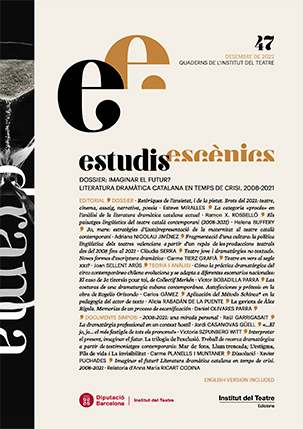Las costuras de una dramaturgia cubana contemporánea. Autoficciones y prótesis en la obra de Rogelio Orizondo
Paraules clau:
teatro cubano, memoria, autoficción, los Novísimos, Rogelio Orizondo, HamletResum
El ensayo trabaja la obra dramática de Rogelio Orizondo (Santa Clara, 1983) y propone una búsqueda concentrada en la autoficción como dispositivo discursivo. A partir del análisis de la pieza Ayer dejé de matarme gracias a ti Heiner Müller (2010), el trabajo aporta la mirada conectiva generacional entre la poética del autor y el resto de sus colegas dramaturgos. Para ello, se presenta esta pieza como modelo desde su desarrollo estructural, a manera de reflejo de un proyecto estético compartido entre los egresados del Instituto Superior de Arte. El texto busca caracterizar la construcción del dispositivo autoficcional en la poética de Rogelio Orizondo, exponer las relaciones intertextuales entre Heiner Müller y el dramaturgo cubano, así como demostrar la incidencia de una memoria prostética en la generación de los Novísimos, de la que el autor es parte. Con una estructura que parte de la visión de Orizondo de la tradición teatral y su autorreflejo en las capas de su escritura, regresa al Hamlet de Shakespeare, para apostar por una recontextualización enfocada en otras problemáticas alejadas del original, esta vez de tipo sociopolítico en Cuba. La investigación demuestra cómo la pieza del dramaturgo inglés funciona a modo de comodín para exponer la resistencia de una generación de autores, que asumen la prótesis de otras temporalidades y geografías para filtrar sus propios cuestionamientos estéticos, éticos y políticos.














